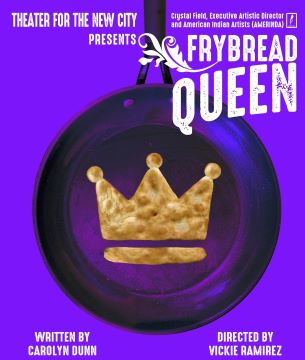TASTY BUT FLAT FRYBREAD
Carolyn Dunn‘s new play The Frybread Queen features three generations of Navajo women gathered at the reservation home of the family matriarch for the funeral of Paul Burns. Authoritative Dawn Jamieson is the matriarch and the deceased’s mother, Jessie Burns. Ria Nez is Jessie’s equally strong-minded daughter and Paul’s sister Carlisle Emmanuel Burns. Elizabeth Rolston sizzles with anger as his divorced wife, Annalee Walker Hayne, who expects an inheritance. Julie Cloutier is suitably intense as his sullenly goth adolescent daughter Lily Savannah Santiago Burns.
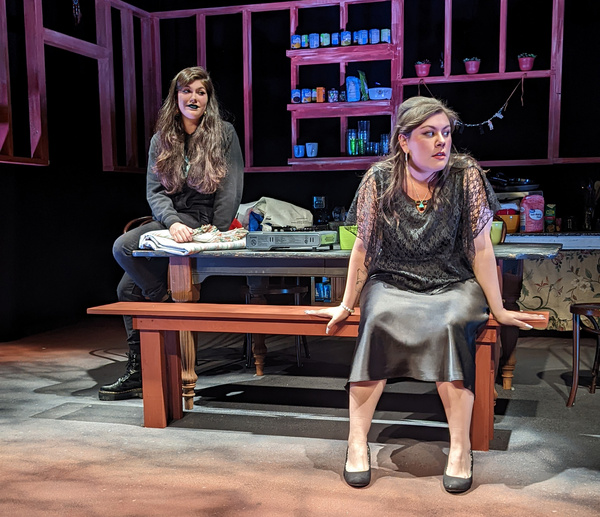 Jolie Cloutier & Ria Nez
Jolie Cloutier & Ria NezThe action takes place in Jessie’s kitchen, a large and realistic setting by Daniel Allen, which suggests the passage of time and the generations who have lived in the house. We quickly learn that young Lily’s Aunt Carlisle and her mother Annalee have a secret agenda. They want to convince Jessie that Lily should leave the reservation and go to live with her mother in California. But neither Jessie nor Lily are inclined to agree.
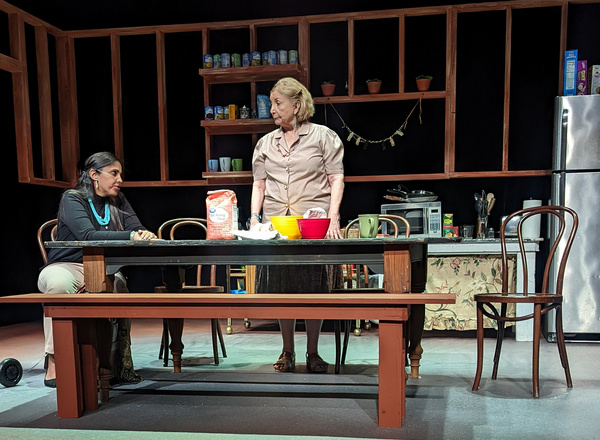 Elizabeth Rolston & Dawn Jamieson
Elizabeth Rolston & Dawn JamiesonAs the conflict heats up, we learn a lot about the family’s history. How Jessie’s husband was abusive towards her son Paul, for whose funeral they have gathered. How the son in question abandoned his wife and child. How each of the four women have different, often ambivalent feelings, about their Native-American identity and the traditions that support, haunt and hinder them in their life choices.
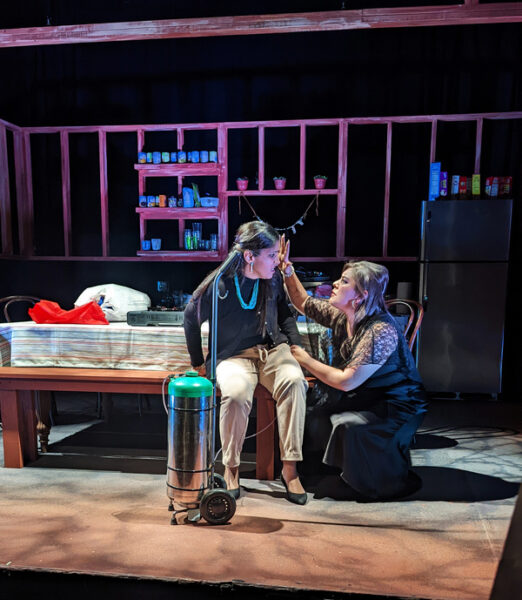 Elizabeth Rolston & Ria Nez
Elizabeth Rolston & Ria NezThis family drama provides the context to discuss many issues important to Native Americans. Even the simple issue of who makes the best frybread — quick bread cooked in deep fat — becomes an occasion for angst as Lily describes how her history teacher told the students that fry bread was not only not authentically Native but was introduced by colonialists and is harmful to eat with its excess of lard and poor nutritional qualities. Frybread — a tradition and a source of pride — may well be a source of diabetes, heart disease and early death. The question is raised but remains unanswered: are all the traditions really worthwhile?
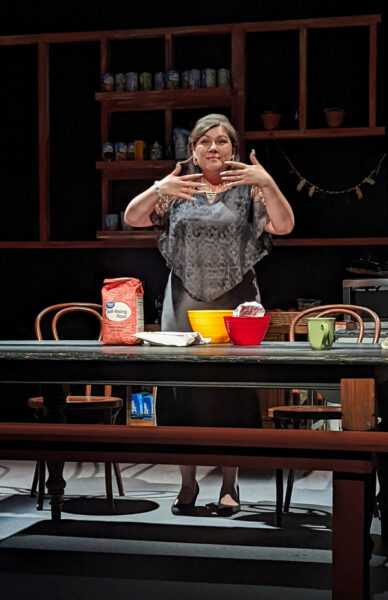 Ria Nez
Ria NezThis confusion about what is valuable and what is dangerous in traditions (both family traditions and Native traditions) seems to be a central theme of the play. These women are struggling with many ghosts of the past. And it is clear that ghosts and the spirit world play a huge role in their lives. At one point, Grandmother Jessie remarks about the desirability of burning down the home of the deceased, precisely to avoid being haunted.
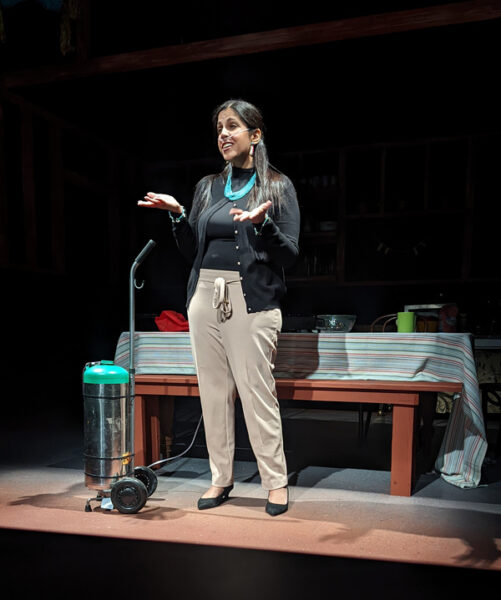 Elizabeth Rolston
Elizabeth RolstonThe extended conversation among the quartet touches on a lot of history, and Dunn does a fine job of creating a feeling of menace, and ambivalence, and the sense of being haunted. Sometimes the haunting seems literal, with mysterious noises and flashes of light punctuating the action; at one point, it may or may not be that the ghost of Lily’s father is dramatically present. These effects have been well handled by lighting designer Andrew Garvis and sound designer Stephanie L. Carlin. The props by Indigo Shea and the costumes by Stephanie Renoj Lopez also contribute to the haunted mood of the piece.
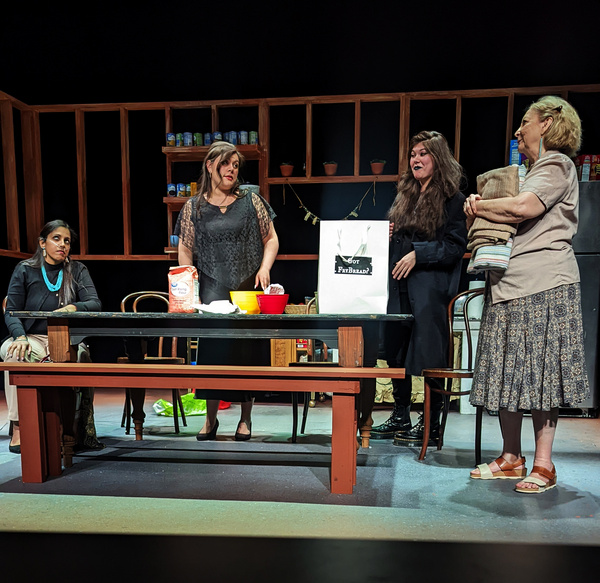 Elizabeth Rolston, Ria Nez, Jolie Cloutier & Dawn Jamieson
Elizabeth Rolston, Ria Nez, Jolie Cloutier & Dawn JamiesonThe best aspect of this production is the creation of mood. But the story is complex and difficult to follow. The confusion is not helped by the unrelentingly slow pace as directed by Vickie Ramirez. The mood and the material are engaging, but the emotional flatness of the performances make it tough to feel deep empathy or involvement. I suspect that this may not be a difficulty for Native-American audiences, as the material might be closer to their lived experience, .
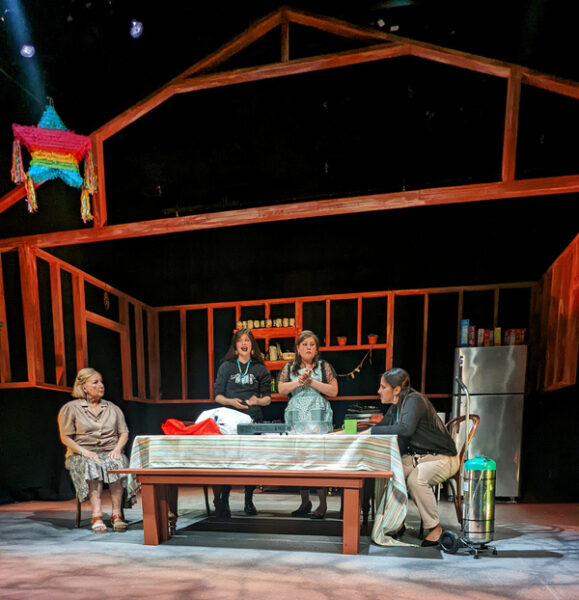 Dawn Jamieson, Jolie Cloutier, Ria Nez, & Elizabeth Rolston
Dawn Jamieson, Jolie Cloutier, Ria Nez, & Elizabeth RolstonThe director, in an artist’s statement, notes that the narrative of the play is “rich with themes of generational trauma, the erosion of tradition, and the enduring impact of colonialism on Indigenous communities.” This is undeniably true, but despite this interesting material, the production is difficult to follow and fails to be emotionally engaging.
photos by Marlene Flores
The Frybread Queen
American Indian Artists Inc. (AMERINDA)
Theatre for the New City, 155 First Avenue at 10th Street
ends on May 12, 2024
for tickets ($15-$18), visit Theatre for the New City
